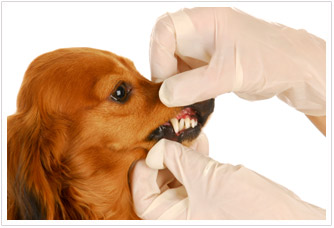|
| |
pet dental CARE
Dental Care
Dental care is a little recognized, yet necessary part of caring for your pets. By the age of three, some 80 percent of all dogs and 70 percent of all cats show signs of dental disease, which can lead to the more serious problems of heart, lung, and kidney disease. Periodontal disease can be prevented and treated. No other procedure performed on small animals does more to help patients than periodic teeth cleaning and after care As plaque and tartar form on teeth and under gums, bacteria collect and multiply. This creates a state of poor dental hygiene that causes foul mouth odor and is cause for concern. Eventually gum disease will develop. |
 |
| More serious health problems, such as heart and kidney disease, may follow. Proper nutrition is central to sound oral health. Along with good nutrition, an annual dental prophylaxis (ultrasonic cleaning, polishing and fluoride treatment) included in your pet’s regular health care program will help maintain good oral hygiene and prevent complications. For the comfort of your pet, this procedure requires anesthesia and, for your pet’s safety, a pre-anesthetic blood test is advised. February is Pet Dental Health Month, where we are offering complimentary dental exams. |
Pre-dental
Our Veterinarians will normally discuss your pet's dental health as required. It is always a good idea to perform preanesthetic blood testing (highly recomended for geriatric patients) before a dental cleaning in order to assess the vitals organs of the body with regards to the anesthetic risk. Our team will then schedule an appointment for your pet's dental cleaning. You will also be informed regarding keeping your dog or cat off-food before the procedure. Typically dental procedures are treated as "day procedures" and your loved one is at home by evening, the same day.
The Procedure
We provide complete dental scaling, polishing, and fluoride treatment. Sometimes dental extractions may be required to prevent further complications of dental disease. Extractions are required more commonly in older patients, but it is also related to the general oral health regardless of the age. Commonly an extraction will be accompanied by short-term pain management for the comfort of your pet and to avoid it going off-food.
Post-dental
Our staff will give you all the required post dental care instructions as well as let you know about the diet recommended by your Veterinarian. It is always advised to feed your pet some soft food for the 1-2 days after a dental cleaning, and then continue a dental tartar control diet. A short course with a safe antibiotic will typically be needed after most dental procedures and the medication will be dispensed at the time of "patient discharge" from the hospital. You are always welcome to contact us with questions at any time.
|
|
